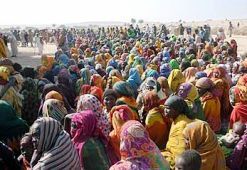Chad belligerents’ parties must not attack civilians, ethnic groups
April 13, 2006 (NEW YORK) — The Chadian government, rebel groups, and their backers in Khartoum must ensure that their forces do not attack civilians or target ethnic groups, Human Rights Watch said today.
 Rebels seeking to oust Chadian President Idriss Déby entered the capital N’Djamena in the morning of April 13. Civilians at risk include the 200,000 Sudanese refugees living in camps in eastern Chad, where fighting continues along the border.
Rebels seeking to oust Chadian President Idriss Déby entered the capital N’Djamena in the morning of April 13. Civilians at risk include the 200,000 Sudanese refugees living in camps in eastern Chad, where fighting continues along the border.
Also at risk are members of the Zaghawa ethnic group, a cross-border minority in Chad and Sudan that has been targeted by the Sudanese government and its “Janjaweed” militia in Darfur.
“Rebel and government commanders alike must order their forces to protect all civilians, regardless of ethnicity,” said Peter Takirambudde, Africa director at Human Rights Watch. “Attacking civilians and targeting ethnic groups are forbidden under the laws of war.”
International humanitarian law, specifically Protocol II to the Geneva Conventions on internal armed conflicts, which Chad ratified in 1997, prohibits both government forces and rebel groups from conducting attacks on civilians and targeting persons based on ethnicity. Article 13 states that “the civilian population and individual civilians shall enjoy general protection against the dangers arising from military operations” and “shall not be the object of attack. Acts or threats of violence the primary purpose of which is to spread terror among the civilian population are prohibited.”
The main offensive on N’Djamena appears to be led by a Chadian rebel coalition, the Front Unique pour le Changement Démocratique au Tchad (FUC), based in neighboring Darfur and supported by the Sudanese government.
The offensive on the capital has so far largely bypassed the refugee camps in eastern Chad. However, if Chadian rebels allied with Khartoum take control of the border region, the refugee camps may be vulnerable to attack from the Sudanese government-backed Janjaweed militia, who have been launching cross-border raids with increasing frequency over the past few months.
“Chad’s internal crisis is closely linked to the Darfur conflict,” Takirambudde said. “The international community must warn Khartoum that it will be held responsible for any abuses against civilians committed by its proxies.”
President Idriss Déby, who took power in a military coup launched from Darfur in 1990, is a member of the Zaghawa ethnic group, as are many members of the Darfur rebel group, the Sudan Liberation Army/Movement (SLA/M). A one-time ally of the Sudanese government, Déby has faced growing domestic opposition over the past six months, including from individuals within his own Zaghawa clan.
Within Sudan, the Sudanese government has attacked Zaghawa in Darfur and used the government-controlled media to accuse them of wanting a “Greater Zaghawaland,” in order to incite other ethnic groups against them.
“The instability in Chad poses the risk of new ethnic reprisals in Chad and Darfur,” said Takirambudde. “Given the links to Darfur, ethnic Zaghawa may be particularly at risk.”
Relations between Chad and Sudan deteriorated sharply in late 2005. Darfur rebels had long used eastern Chad as a logistical supply base and received support from Chadian officials. In December Chadian rebels hosted by the Sudanese government in Darfur attacked military bases in eastern Chad.
In February, Sudan and Chad agreed to normalize relations and allow 100 military monitors from the African Union to patrol their common border. The A.U. monitors have just begun their deployment.
Human Rights Watch documented in February the spread of attacks on civilians from Darfur into Chad in “Darfur Bleeds: Recent Cross-Border Violence in Chad.” It has published reports since 2004 detailing crimes against humanity, “ethnic cleansing,” and war crimes committed by Sudanese government forces against civilians in Darfur.
(HRW)
